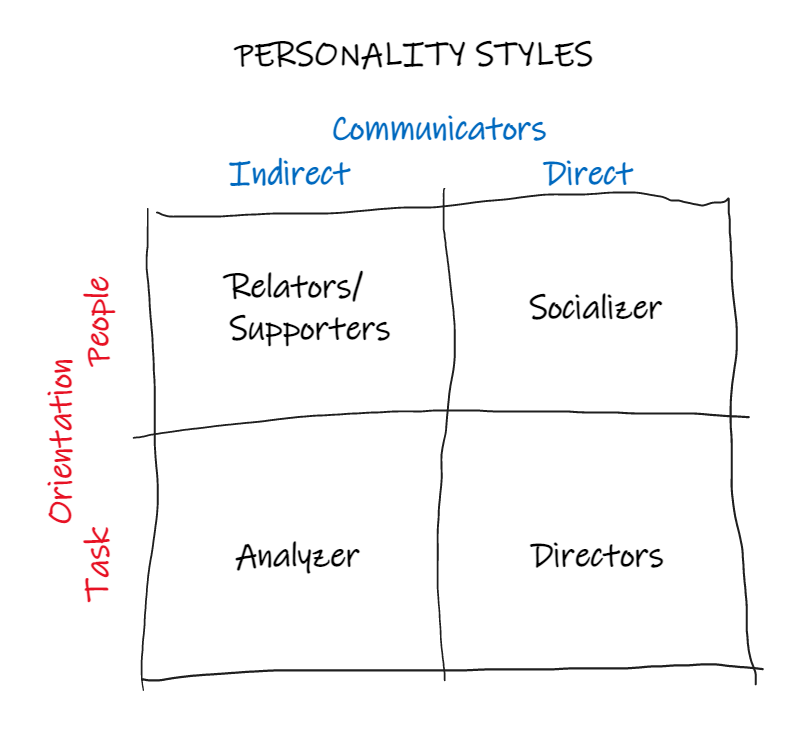
Communication and talking were important for humans back in the day and it is very important today as well. A significant percentage of personal success is based on the ability to communicate with other people. There is a stereotype that software developers, programmers, and in general engineers are introverts. Certainly, there is a truth in that stereotype, but they still spend significant time communicating with other people. Identifying the personality and classifying it into one of the 4 main personality styles with whom we work or live can be very helpful to improve communication with that person.
When and Why the Human Language was Invented?
Researchers and (language) scientists argue about how old human language is. There are different assumptions and the number of years varies from 50.000 to 20+ million. The truth is nobody knows. Talking is an activity unique to Homo sapiens. Other animals on Earth can communicate but none of them developed language as Homo sapiens did. Maybe that’s one of the main skills that Homo sapiens developed so that they can stay alive on Earth. Communication and talking as one of the unique forms among the spices is a great basis for successful collaboration and cooperation.
The system that humans developed in which they are able to organize themselves in large numbers (Gorillas can organize themselves as well but not in a form and so many as humans can) made the human race alive on Earth. Some scientists can’t agree that the human language has been invented but that evolved along the way (~300.000 years period). [When was talking invented? A language scientist explains how this unique feature of human beings may have evolved by Richard Futrell]
Besides the uncertainty and unknown answers to the questions of when, how, and why the human language has been invented/evolved, I hope that science and researchers can agree that the human language is one of the main reasons that humans are still on Earth among the other animals who in general are much stronger than Humans.
We (humans) can communicate well which is a basis for successful collaboration, which then leads to the potential for massive collaboration by which we managed to take care of ourselves from the other animals on Earth, and by that survive.
Need For Improvements in Communication
If back in the day people developed the human language for better communication to be able to survive, today we need to improve our communication and talking skills constantly, so that we can develop complex distributed software solutions, build satellites, fight pandemics, and other great things that are done by humans only.
Conversation Elements and Attributes
There are three logical parts of any conversation according to Aristotle:
- Ethos
the character of the person - Pathos
connecting with the emotions (person’s problems and needs) - Logos
the factual content of the conversation
There are three attributes of any conversation according to Albert Mehrabian
- Impact of Words (account for 7% of the message)
- The tone of voice (38%)
- Body language (55%)
As a quick summary by taking into consideration Aristotle’s structure of a conversation and Mehrabian’s attributes I would write:
Summary
Identify the character or a personality style, understand his/her needs and problems, and then discuss the factual subject. Take into consideration Mehrabian’s 7-38-55 rule and don’t forget that the words are not significant in sending the message to the person who you speak with, and be an active listener.
4 Basic Personality Styles
This chapter includes 4 different personality styles that can help you to recognize a character of a person to who you are speaking, a person to whom you are a supervisor or a manager, a person who is your peer, or a candidate who came on an interview for a job.
There are 4 basic personality styles based on two spectrums:
- Communicators (Indirect, Direct)
- Orientation (People, Task)

- Relators – easygoing
- Analyzers – details
- Socializers – achievement
- Directors – result
Relators/Supporters
- Easygoing
- Quiet
- Self-contained
- Not expressive
- Sensitive
- People-oriented
- Supportive
- Steady
- A good team member
- Concerned about people’s opinions
- They’re really grieved for pain if there’s any kind of friction among people
- Relator tends to gravitate toward fields where they are most effective
- They usually read People Magazines
- Extreme: hypersensitive to the opinions of others
- Their primary concern: Let’s get along, let’s all be friends (stability and cooperation)
Recommendations:
- This type of person is genuinely interested in knowing about you
- This type of person requires a slow, low keyed, easygoing, friendly, warm communication approach
- In communication with this type of person you have to go slowly, you have to be patient, you can’t be pushy. They take time to make decisions, and they like to talk to other people
- Use the term “we” when talking with them
Best fit professions and fields:
- Nursing
- Social services
- Teaching
- Small child development
- Psychology
Analyzers
- Not concerned so much about people up here
- Very concerned about doing the job
- Inward directed
- Disciplined
- Fastidious and detail-oriented
- Just facts and wanna be accurate
- Methodical
- Persistent
- Organized
- Cautious
- Extreme: can be an uncommunicative bureaucrat, very meticulous and picky about every detail
- Their primary concern: Let’s be accurate
Recommendations:
- Don’t micromanage them
- Give them time and space to think things through
- Offer as much data and information as you can
- Bring them challenges and problems to solve
- Allow them to express and implement their own ideas
- Don’t pressure them into making a quick decision
Best fit professions and fields:
- Computers
- Accounting
- Engineering
- Bookkeeping
Socializers
- Outgoing, direct, voluble, and very people oriented
- Expressives
- Executives, because they are very integrated
- Very strong focus on people
- Very strong focus on achievement and getting things done
- Upfront with their opinion
- Influencing
- Risk taker
- Impatient
- Competitive
- Inspiring
- Spontaneous
- Loud and animated
- Achievement with, or through other people (achievement-oriented)
- Their primary concern: Recognition and approval
Best fit professions and fields:
- Real estate agent
- Host/Hostess
- Salesperson
- Teacher
- Therapist
- Nurse
- Customer service agent
- Human resources professional
Directors
- Outgoing, direct, and task-oriented
- Bottom-line oriented
- Just the facts
- Impatient
- Quick decisions
- Don’t need a lot of details
- They read the summaries of the summaries
- They usually read Sucess Magazine, Forbs, Businessweek
- Extreme: This type of person is a dictator, a tyrant, angry, directive, no patience at all, short-tempered
- Their primary concern: Let’s get results!
Recommendations:
- You gotta get right to the bottom line. Don’t waste time saying “Hi, how are you doing? How’s everything going?”
Best fit professions and fields:
- President/CEO
- General contractor
- Salesperson or sales manager
- Business owner
- Politician
- Entrepreneur
- Police/military officer
- Manager
- Executive

Be the first to comment